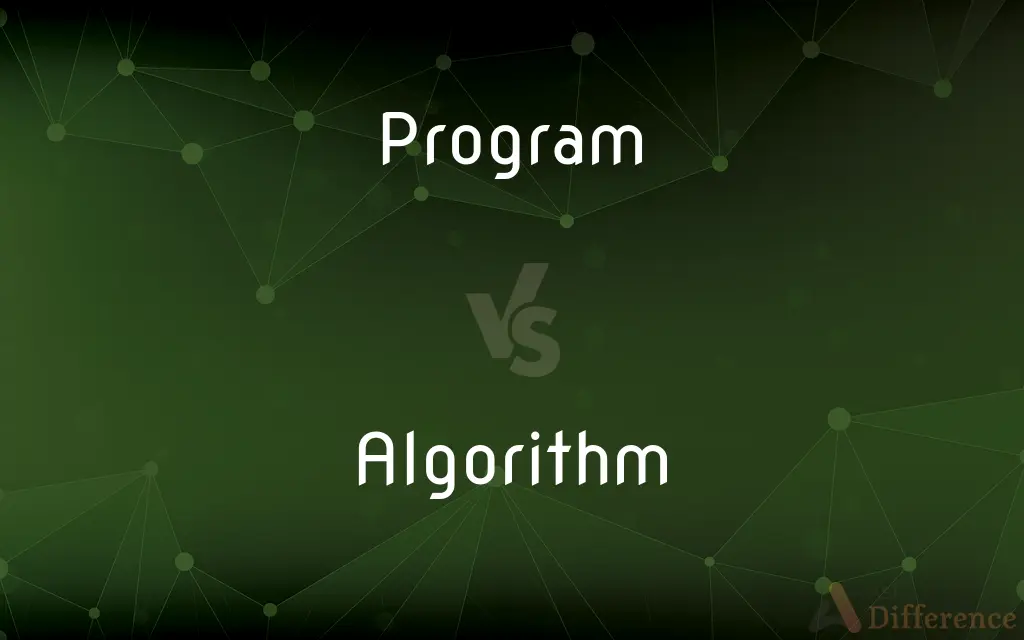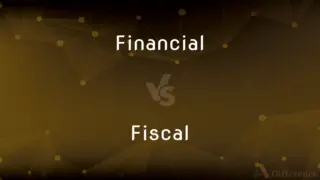Program vs. Algorithm — What's the Difference?
By Urooj Arif & Fiza Rafique — Updated on March 10, 2024
Program is a comprehensive set of instructions for computers to perform tasks, incorporating algorithms, which are step-by-step procedures for solving specific problems.

Difference Between Program and Algorithm
Table of Contents
ADVERTISEMENT
Key Differences
A program is a set of instructions that a computer follows to perform a specific task. These instructions are written in a programming language and can include multiple algorithms. An algorithm, on the other hand, is a sequence of steps designed to solve a particular problem or perform a specific computation.
Programs are implemented in a programming language, which can vary from high-level languages like Python or Java to low-level languages like Assembly, depending on the complexity and requirements of the task. Algorithms, however, are abstract and can be described in natural language, pseudocode, or through flowcharts, independent of programming languages.
The creation of a program involves various stages including design, coding, testing, and debugging. It encompasses algorithms as part of its logic, but also includes other elements such as user interface, data storage, and integration with other software. Algorithms focus solely on the logical sequence of steps to reach a solution and do not concern themselves with these additional aspects.
While a program is executed by a computer to perform tasks ranging from simple calculations to complex data analysis, an algorithm is more concerned with the efficiency and effectiveness of the problem-solving process. It is the foundation upon which programs are built, ensuring that the tasks are done in an optimized manner.
The performance of a program is often measured by its speed, memory usage, and scalability, among other factors. This performance heavily depends on the underlying algorithms it employs, as a well-designed algorithm can significantly improve efficiency and reduce resource consumption.
ADVERTISEMENT
Comparison Chart
Definition
A set of coded instructions for a computer to follow.
A step-by-step procedure for solving a problem.
Nature
Practical implementation.
Theoretical concept.
Dependency
Depends on programming languages.
Language-independent.
Components
Includes algorithms, user interface, data storage.
Focuses solely on the sequence of steps.
Objective
To perform specific tasks or solve problems.
To outline the best method for problem-solving.
Compare with Definitions
Program
A set of instructions that directs a computer to perform specific tasks.
A banking software program manages accounts and transactions.
Algorithm
A procedure or formula for solving a problem.
The sorting algorithm efficiently organized the data.
Program
Executable by a computer to achieve desired outcomes.
After debugging, the program ran smoothly.
Algorithm
Focuses on logic and efficiency.
They chose the algorithm for its low complexity and fast execution.
Program
A sequence of coded commands for a specific application.
She developed a program for data analysis.
Algorithm
A step-by-step approach to perform a specific task.
Her algorithm for cake recipes guarantees perfect results.
Program
Involves variables, control structures, and functions.
The program included loops and conditionals for logic flow.
Algorithm
Fundamental to program development.
Each part of the program was based on a carefully designed algorithm.
Program
Can be written in various programming languages.
He wrote the program in Python because of its readability.
Algorithm
Independent of programming languages.
The algorithm was outlined in pseudocode before implementation.
Program
A listing of the order of events and other pertinent information for a public presentation.
Algorithm
In mathematics and computer science, an algorithm ( (listen)) is a finite sequence of well-defined, computer-implementable instructions, typically to solve a class of specific problems or to perform a computation. Algorithms are always unambiguous and are used as specifications for performing calculations, data processing, automated reasoning, and other tasks.
Program
The presentation itself
A program of piano pieces.
Algorithm
A finite set of unambiguous instructions that, given some set of initial conditions, can be performed in a prescribed sequence to achieve a certain goal and that has a recognizable set of end conditions.
Program
A scheduled radio or television show.
Algorithm
(countable) A collection of ordered steps that solve a mathematical problem. A precise step-by-step plan for a computational procedure that possibly begins with an input value and yields an output value in a finite number of steps.
Program
An ordered list of events to take place or procedures to be followed; a schedule
A program of physical therapy for a convalescent.
Algorithm
Calculation with Arabic numerals; algorism.
Program
A system of services, opportunities, or projects, usually designed to meet a social need
"Working parents rely on the center's after-school latchkey program" (New York Times).
Algorithm
A precise rule (or set of rules) specifying how to solve some problem; a set of procedures guaranteed to find the solution to a problem.
Program
A course of academic study; a curriculum.
Algorithm
A precise rule (or set of rules) specifying how to solve some problem
Program
A plan or system of academic and related or ancillary activities
A work-study program.
Program
A plan or system of nonacademic extracurricular activities
The football program.
Program
A set of coded instructions that enables a machine, especially a computer, to perform a desired sequence of operations.
Program
An instruction sequence in programmed instruction.
Program
All or part of the genetic code of a cell or organism.
Program
A characteristic sequence of developmental or behavioral events in a cell or organism, often considered to result from the expression of genes.
Program
A stimulus or training sequence that causes an organism to exhibit a behavior, as by conditioning.
Program
To include or schedule in a program
Program a new musical composition.
Program
To design a program for; schedule the activities of.
Program
To provide (a machine) with a set of coded working instructions.
Program
To stimulate or train to perform automatically in a specified way
Consumers who have been programmed to buy brand names.
Program
To prepare an instructional sequence for (material to be taught) in programmed instruction.
Program
To provide (a cell or organism, for example) with a genetic program
Cells that are programmed to produce insulin.
Program
To cause (an effect or action) by means of a genetic program; determine genetically
"The basic housekeeping duties that a human and a yeast cell must perform are the same and are programmed by recognizably similar genes inherited from a common, single-celled ancestor" (Nicholas Wade).
Program
A set of structured activities.
Our program for today’s exercise class includes swimming and jogging.
Program
A leaflet listing information about a play, game or other activity.
The program consisted of ads for restaurants and the credits of everyone connected with the play.
Program
(politics) A set of principle goals which are supported by a political party or individual candidate
Program
(broadcasting) A performance of a show or other broadcast on radio or television.
Tonight’s program was hosted by Johnny Carson.
Program
(computing) A software application, or a collection of software applications, designed to perform a specific task.
The program runs on both Linux and Microsoft Windows.
Program
A particular mindset or method of doing things.
Program
(transitive) To enter a program or other instructions into (a computer or other electronic device) to instruct it to do a particular task.
He programmed the DVR to record his favorite show.
Program
(transitive) To develop (software) by writing program code.
I programmed a small game as a demonstration.
Program
(transitive) To put together the schedule of an event.
Mary will program Tuesday’s festivities.
Program
(broadcasting) To schedule the programming; to determine what will be broadcast.
Program
(transitive) To cause to automatically behave in a particular way.
The lab rat was programmed to press the lever when the bell rang.
Program
Same as Programme.
Program
A system of projects or services intended to meet a public need;
He proposed an elaborate program of public works
Working mothers rely on the day care program
Program
A series of steps to be carried out or goals to be accomplished;
They drew up a six-step plan
They discussed plans for a new bond issue
Program
(computer science) a sequence of instructions that a computer can interpret and execute;
The program required several hundred lines of code
Program
An integrated course of academic studies;
He was admitted to a new program at the university
Program
A radio or television show;
Did you see his program last night?
Program
A performance (or series of performances) at a public presentation;
The program lasted more than two hours
Program
A document stating the aims and principles of a political party;
Their candidate simply ignored the party platform
They won the election even though they offered no positive program
Program
An announcement of the events that will occur as part of a theatrical or sporting event;
You can't tell the players without a program
Program
Arrange a program of or for;
Program the 80th birthday party
Program
Write a computer program
Common Curiosities
What is a program?
A program is a set of instructions that a computer executes to perform specific tasks.
How does an algorithm differ from a program?
An algorithm is a conceptual sequence of steps solving a specific problem, whereas a program is a set of instructions written in a programming language that includes one or more algorithms.
What is an algorithm?
An algorithm is a detailed step-by-step instruction set or formula for solving a problem or completing a task.
Are algorithms dependent on programming languages?
No, algorithms are language-independent concepts that can be expressed in natural language, pseudocode, or any programming language.
Can the same algorithm be implemented in different programs?
Yes, an algorithm can be applied across various programs and in different programming languages to solve similar problems.
Why are algorithms important in programming?
Algorithms are crucial because they outline the most efficient way to solve a problem, directly impacting the performance and effectiveness of a program.
How do programming languages affect program development?
Programming languages determine the syntax and features available for implementing algorithms and other program components, affecting development complexity and efficiency.
Can a program exist without algorithms?
Technically, no. Every program must incorporate some form of algorithm to perform its tasks, even if simple.
What are the key components of a program?
Key components include the user interface, data storage, control structures, and the algorithms it implements.
What is the significance of choosing the right algorithm for a program?
Selecting the appropriate algorithm is crucial for optimizing a program’s performance, ensuring it runs efficiently in terms of speed and resource usage.
How do you measure the efficiency of an algorithm?
Efficiency is measured by its time complexity and space complexity, indicating how fast an algorithm runs and how much memory it requires.
Is it possible for two algorithms to solve the same problem differently?
Yes, multiple algorithms can address the same problem, each with varying efficiencies and complexities.
What role do algorithms play in software development?
Algorithms form the foundation of software logic and problem-solving strategies, crucial for developing efficient and effective software solutions.
Do all programs perform tasks the same way?
No, different programs may use different algorithms or strategies to accomplish similar tasks, resulting in varying efficiencies.
Can a non-programmer understand algorithms?
Yes, algorithms can be explained in simple terms or through pseudocode, making them accessible to non-programmers.
Share Your Discovery

Previous Comparison
Leaf vs. Leaflet
Next Comparison
Financial vs. FiscalAuthor Spotlight
Written by
Urooj ArifUrooj is a skilled content writer at Ask Difference, known for her exceptional ability to simplify complex topics into engaging and informative content. With a passion for research and a flair for clear, concise writing, she consistently delivers articles that resonate with our diverse audience.
Co-written by
Fiza RafiqueFiza Rafique is a skilled content writer at AskDifference.com, where she meticulously refines and enhances written pieces. Drawing from her vast editorial expertise, Fiza ensures clarity, accuracy, and precision in every article. Passionate about language, she continually seeks to elevate the quality of content for readers worldwide.














































